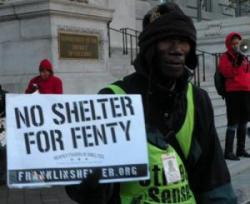 Continuing the Dream: Organizing for Local Justice in 2008 Compiled by Andrew Willis Garces and Mackenzie Baris With the election of the first African-American president, 2008 will surely live in our nation’s history as the culmination of a dream for many. Here in “Chocolate City”, countless DC residents volunteered their time canvassing and phonebanking in Virginia, and took to the streets together on election day, celebrating into the early hours of the morning at 14th and U and marching to reclaim the White House. For DC, Barack Obama’s victory brought energy and hope to the end of a long year of very local struggle. As all eyes turn again to DC for the inauguration, we offer a reflection on the struggles and victories of the past year.
Continuing the Dream: Organizing for Local Justice in 2008 Compiled by Andrew Willis Garces and Mackenzie Baris With the election of the first African-American president, 2008 will surely live in our nation’s history as the culmination of a dream for many. Here in “Chocolate City”, countless DC residents volunteered their time canvassing and phonebanking in Virginia, and took to the streets together on election day, celebrating into the early hours of the morning at 14th and U and marching to reclaim the White House. For DC, Barack Obama’s victory brought energy and hope to the end of a long year of very local struggle. As all eyes turn again to DC for the inauguration, we offer a reflection on the struggles and victories of the past year.
INDEX: *The Year in Struggle *Victories Organized by Issue Housing/Gentrification Labor/Workers Education/Schools Police Accountability Accountable Development/Community Rights *Spotlight: Tenants from across the City Organize for Improved Housing Conditions and Tenant Protections *Read last year’s Making the Dream City: Organizing for Local Justice in 2007
THE YEAR IN STRUGGLE
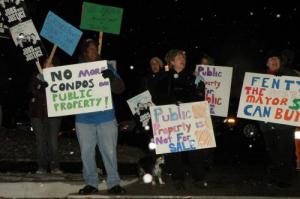 The second year of Adrian Fenty’s term as Mayor saw increased resistance to his administration’s attempts to push through policies without community input, with major battles fought over the closing of the Franklin Shelter, the closing of DC Public Schools, the attacks on public sector workers, and cuts to public services in the wake of a proposed budget shortfall. The Fair Budget Coalition fought for greater budget transparency and funding for human needs, while parent members of Empower DC‘s Childcare 4 All Campaign continued to advocate for increased childcare subsidy funding, which remains the second highest expense for low-income households.
The second year of Adrian Fenty’s term as Mayor saw increased resistance to his administration’s attempts to push through policies without community input, with major battles fought over the closing of the Franklin Shelter, the closing of DC Public Schools, the attacks on public sector workers, and cuts to public services in the wake of a proposed budget shortfall. The Fair Budget Coalition fought for greater budget transparency and funding for human needs, while parent members of Empower DC‘s Childcare 4 All Campaign continued to advocate for increased childcare subsidy funding, which remains the second highest expense for low-income households.
The past year also brought the blossoming of a citywide tenants’ rights movement. Tenant leaders gained an important media win with the Washington Post series, “Forced Out,” which gave long-overdue exposure to the mechanisms and impact of gentrification. Activists and tenants across the city were further galvanized by the fire that devastated 3145 Mt. Pleasant St NW, which had been the building with the most code violations in the city, and whose tenant association was expected to win a long-running legal dispute with the landlord the week of the fire. The energy and outrage generated in the days after the fire — which saw thousands of residents pitch-in to help the displaced — culminated in emergency legislation to increase the penalties on builders and developers who violate the District’s housing code.
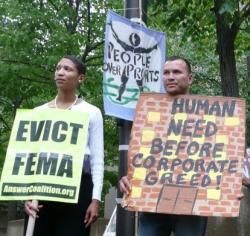 Local housing activists rallied at FEMA to demand right to return for Katrina victims, linking the demand to local efforts to save affordable housing. While on-going struggles such as these gained ground, new cries for justice arose as well. DC Fights Back brought together housing and public health advocates for a World AIDS Day protest at HUD to demand more housing for people with HIV/AIDS. Activists also protested the discriminatory treatment of firefighters of color, accusing Fire Department brass of unfairly reassigning and penalizing black firefighters in leadership roles, rallying at DCFD headquarters and demanding that the city establish a civilian review board for the department.
Local housing activists rallied at FEMA to demand right to return for Katrina victims, linking the demand to local efforts to save affordable housing. While on-going struggles such as these gained ground, new cries for justice arose as well. DC Fights Back brought together housing and public health advocates for a World AIDS Day protest at HUD to demand more housing for people with HIV/AIDS. Activists also protested the discriminatory treatment of firefighters of color, accusing Fire Department brass of unfairly reassigning and penalizing black firefighters in leadership roles, rallying at DCFD headquarters and demanding that the city establish a civilian review board for the department.
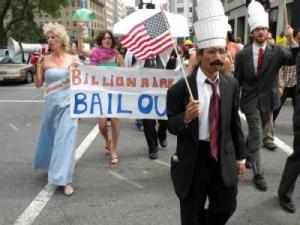 At both a local and national level, the city was home to politicians scrambling to give away taxpayer money and resources to corporate interests. The People’s Property Campaign gained momentum in their campaign to end the city’s practice of giving away public land to private corporations, winning the introduction of legislation that would create a new community input process for determining the reuse of public land and prohibit the outright sale of land. Public property activists knocked on doors throughout the city, and mobilized hundreds for a public hearing, lobby days, an actions at City Hall. Meanwhile, DC residents used their strategic location to stage creative protests against the Wall Street bailout, earning attention from the media and sending a message to financial institutions.
At both a local and national level, the city was home to politicians scrambling to give away taxpayer money and resources to corporate interests. The People’s Property Campaign gained momentum in their campaign to end the city’s practice of giving away public land to private corporations, winning the introduction of legislation that would create a new community input process for determining the reuse of public land and prohibit the outright sale of land. Public property activists knocked on doors throughout the city, and mobilized hundreds for a public hearing, lobby days, an actions at City Hall. Meanwhile, DC residents used their strategic location to stage creative protests against the Wall Street bailout, earning attention from the media and sending a message to financial institutions.
What follows is a snapshot of the organizing victories won in 2008 by groups of people working for a concrete change to bring about a more just DC. The list documents the work of groups winning victories through campaigns, or a series of actions taken to achieve a shared goal. It isn’t comprehensive and we invite others to contribute with edits and additions by writing to mbaris [at] dclabor [dot] org.
Kennedy-Warren Tenants & Rent Administrator Tenants at the Kennedy-Warren apartment building on Connecticut Ave staged a rent strike early in the year to stop the management company, BF Saul, from implementing unfair “surcharges” and “renovation fees.” The dispute led the company to sign an agreement with many of the tenants, offering them incentives and locking in rates for occupied units in exchange for allowing the company to dramatically increase rents for unoccupied units (the building was 2/3 empty at the time). Following continued organizing by the tenants, then-Rent Administrator Grayce Wiggins ruled the “voluntary agreement” illegal, calling it “patently coercive.” During the fight, management company officials warned tenant leaders that they would call in their chips with the Fenty Administration in order to win. Five months after ruling on the dispute, Wiggins was fired. Tenant outrage at this blatant act of revenge resulted in City Council hearings into the incident, with a bill passed in November removing the rent administrator position from the mayor’s purview.
Chinese Residents Fight New Chapter in Legacy of Displacement In 1980 the District government began construction on the city’s first convention center, in the historic Chinatown neighborhood. To make way for the conference space, a section of the area’s rental housing, home to a large Chinese immigrant population, was razed. (Almost fifty years after the city’s original Chinatown was displaced by the Federal Triangle development.) Resident protests forced the city to construct the 153-unit Wah Luck House as a home for displaced families. Fifteen years later, the core of the neighborhood was vastly reduced by the Verizon Center development project. This year tenant advocates learned through a web advertisement of the intent of Wah Luck’s current owners to sell, threatening its status as a Section-8 building. Staff with the Asian Pacific American Legal Resource Center, Housing Counseling Services, Asian Senior Center, and D.C. Language Access Coalition sprang into action to support the tenants in forming an association and understanding their rights under the Tenant Opportunity to Purchase Act. The elected board has begun an effort to build the membership and understand their rights as organized tenants.
Tenant Advocate Funding Restored It’s an unavoidable reality that tenant rights laws are useless if tenants aren’t aware of their rights. And most tenants in DC that do know their rights have either learned from another tenant or from one of a handful of tenant organizers. Most of the paid organizers work for two city-funded agencies, Housing Counseling Services and Latino Economic Development Corporation. Together, these two groups provided services to tenants in 163 buildings with 13,600 units in the first nine months of the year alone, from legal support to technical assistance for the tenant purchase process. In September they were informed that their tenant education funding would be drastically reduced the coming fiscal year under city contracts going into effect October 1. Tenant leaders immediately organized a letter-writing and call-in campaign to stop this vicious cutback. In under a week, DHCD Director Leila Edmonds announced that the funding would be restored through the end of the year.
Barry Farm Tenants Win Improvements 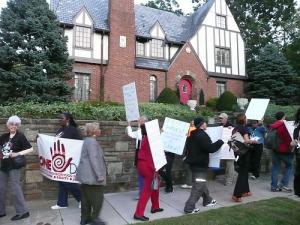 Residents of Barry Farm who had been hearing about the supposed redevelopment of their neighborhood for the previous two years received a shock from the director of the city’s New Communities Initiative, Buwa Binitie, at a community meeting in January: The city needed $700 million to do the work, and would only have $200 million on hand. In response to this uncertainty, dozens of residents organizing with ONE DC demanded answers from Councilmember Marion Barry and Mayor Fenty at public meetings in May and June. They won a surprising agreement from the mayor to abide by whatever plan the residents decided upon, and, following complaints that the city was neglecting current needs in favor of never-implemented plans, forced the Housing Authority to make hundreds of repairs to address longstanding maintenance issues. An important victory, to be sure, but the residents await fulfillment of the many promises made to them. At the top of the list of concerns is that they not be displaced like public housing residents before them, such as Arthur Capper/Carrolsburg residents, who have supported Barry Farm residents organizing. Video of the mayor’s promise: http://www.youtube.com/watch?v=rMc1YTCbI3MrnrnLABOR/WORKERS
Residents of Barry Farm who had been hearing about the supposed redevelopment of their neighborhood for the previous two years received a shock from the director of the city’s New Communities Initiative, Buwa Binitie, at a community meeting in January: The city needed $700 million to do the work, and would only have $200 million on hand. In response to this uncertainty, dozens of residents organizing with ONE DC demanded answers from Councilmember Marion Barry and Mayor Fenty at public meetings in May and June. They won a surprising agreement from the mayor to abide by whatever plan the residents decided upon, and, following complaints that the city was neglecting current needs in favor of never-implemented plans, forced the Housing Authority to make hundreds of repairs to address longstanding maintenance issues. An important victory, to be sure, but the residents await fulfillment of the many promises made to them. At the top of the list of concerns is that they not be displaced like public housing residents before them, such as Arthur Capper/Carrolsburg residents, who have supported Barry Farm residents organizing. Video of the mayor’s promise: http://www.youtube.com/watch?v=rMc1YTCbI3MrnrnLABOR/WORKERS
Workers and Community Unite to Win Paid Sick Days for All 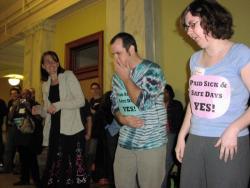 On March 4th, DC became the second city in the nation to guarantee all workers access to paid sick days, and the first to provide paid time off to victims of domestic violence, stalking, and sexual assault. The victory was the result of years of careful organizing by a broad coalition of supporters, led by the DC Employment Justice Center, with support from DC Jobs with Justice, labor unions, advocacy organizations, direct service providers, and grassroots community groups. In the year leading up to the vote, supporters reached out to workers all over DC, collected hundreds of postcards and letters, mobilized dozens of people for lobby days, ran a creative ad campaign, produced reports and analysis, appeared on radio shows, leafletted, postered, and bombarded the Council with emails on a bi-monthly basis. Under the Accrued Sick and Safe Days Act of 2008, full-time workers at businesses with over 100 employees will earn 7 days a year to take care of their own health, the health of family members, or address a domestic violence situation. Workers at businesses with 25-99 employees will earn 5 days, and workers at businesses of 24 or fewer will earn 3 days. Part-time workers will earn paid time on a pro-rated basis.
On March 4th, DC became the second city in the nation to guarantee all workers access to paid sick days, and the first to provide paid time off to victims of domestic violence, stalking, and sexual assault. The victory was the result of years of careful organizing by a broad coalition of supporters, led by the DC Employment Justice Center, with support from DC Jobs with Justice, labor unions, advocacy organizations, direct service providers, and grassroots community groups. In the year leading up to the vote, supporters reached out to workers all over DC, collected hundreds of postcards and letters, mobilized dozens of people for lobby days, ran a creative ad campaign, produced reports and analysis, appeared on radio shows, leafletted, postered, and bombarded the Council with emails on a bi-monthly basis. Under the Accrued Sick and Safe Days Act of 2008, full-time workers at businesses with over 100 employees will earn 7 days a year to take care of their own health, the health of family members, or address a domestic violence situation. Workers at businesses with 25-99 employees will earn 5 days, and workers at businesses of 24 or fewer will earn 3 days. Part-time workers will earn paid time on a pro-rated basis.
Security Officers Win Living Wages and Benefits 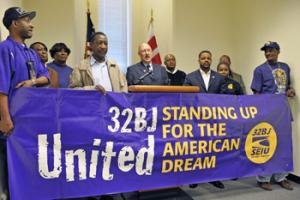 Since September 11th, private security has been a growth industry in DC. But like other service workers, security officers at downtown buildings usually made less than $10 per hour and worked without paid sick days, health benefits, or control over their schedules. Workers began organizing four years ago, and won their first union contract through SEIU Local 32BJ on April 10th of this year. The contract establishes a minimum starting salary of $12.40 an hour, with 50 cent raises for officers who were already making above that level. The companies will also pay for health insurance for all full-time workers. Part-time officers did not yet gain full health benefits, but they and their families will receive some employer-paid benefits, such as prescription drugs, dental care, vision care and life insurance. The contract also provides 8 paid holidays and 7 paid personal days, as well as addressing important job quality and security issues. The contract covers 1,500 officers working for Admiral Security, AlliedBarton, Guardsmark and Securitas at commercial office buildings in DC. Together these companies employ about three-quarters of the District’s office building security workforce.
Since September 11th, private security has been a growth industry in DC. But like other service workers, security officers at downtown buildings usually made less than $10 per hour and worked without paid sick days, health benefits, or control over their schedules. Workers began organizing four years ago, and won their first union contract through SEIU Local 32BJ on April 10th of this year. The contract establishes a minimum starting salary of $12.40 an hour, with 50 cent raises for officers who were already making above that level. The companies will also pay for health insurance for all full-time workers. Part-time officers did not yet gain full health benefits, but they and their families will receive some employer-paid benefits, such as prescription drugs, dental care, vision care and life insurance. The contract also provides 8 paid holidays and 7 paid personal days, as well as addressing important job quality and security issues. The contract covers 1,500 officers working for Admiral Security, AlliedBarton, Guardsmark and Securitas at commercial office buildings in DC. Together these companies employ about three-quarters of the District’s office building security workforce.
Grocery Workers Fight Back Benefit Cuts 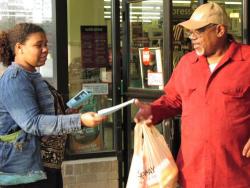 This Spring, nearly 20,000 Safeway and Giant workers in DC, MD, and VA found themselves facing the threat of big cuts to their hard-won health care and pension plans. In response, members of UFCW Local 400 mobilized to prepare for a strike. Coordinated by DC Jobs with Justice and the Metro Washington AFL-CIO, hundreds of community members held dozens of actions, leafleting, delivering letters to managers, holding press conferences, and giving support cards to workers. The pressure worked, resulting in a new contract that provides significant wage increases that will total $2.82 an hour over the life of the contract for the 70% of the workers who are at the top of the wage scale. Starting wages for new hires have also increased, with an accelerated pay scale so the new workers can earn more, faster. Among the company proposals defeated by the union was a 10% benefits co-pay for existing employees, a 25% co-pay hike for retirees and the elimination of holiday and Sunday premium wages.
This Spring, nearly 20,000 Safeway and Giant workers in DC, MD, and VA found themselves facing the threat of big cuts to their hard-won health care and pension plans. In response, members of UFCW Local 400 mobilized to prepare for a strike. Coordinated by DC Jobs with Justice and the Metro Washington AFL-CIO, hundreds of community members held dozens of actions, leafleting, delivering letters to managers, holding press conferences, and giving support cards to workers. The pressure worked, resulting in a new contract that provides significant wage increases that will total $2.82 an hour over the life of the contract for the 70% of the workers who are at the top of the wage scale. Starting wages for new hires have also increased, with an accelerated pay scale so the new workers can earn more, faster. Among the company proposals defeated by the union was a 10% benefits co-pay for existing employees, a 25% co-pay hike for retirees and the elimination of holiday and Sunday premium wages.
Telecommunications Workers Win Job Security  This summer members of Communications Workers of America Local 2336 threatened a strike against telecommunications giant Verizon to win a contract that boosts benefits and pensions for Verizon workers. The contract, which covers workers across the East Coast, including DC, also eliminates the subcontracting of work in a number of job areas, converts many temporary jobs to permanent and brings additional jobs associated with Verizon’s cutting edge FiOS technology into the union bargaining units, as well as extending union rights to Verizon Business workers. Overall, the settlement should create 2,500 new union jobs. In a second victory, the District of Columbia and Verizon reached an agreement after a year of negotiations that will bring FiOS to the nation’s capital, preserving and expanding telecom jobs in DC and helping to close the digital divide between DC and its suburban neighbors.
This summer members of Communications Workers of America Local 2336 threatened a strike against telecommunications giant Verizon to win a contract that boosts benefits and pensions for Verizon workers. The contract, which covers workers across the East Coast, including DC, also eliminates the subcontracting of work in a number of job areas, converts many temporary jobs to permanent and brings additional jobs associated with Verizon’s cutting edge FiOS technology into the union bargaining units, as well as extending union rights to Verizon Business workers. Overall, the settlement should create 2,500 new union jobs. In a second victory, the District of Columbia and Verizon reached an agreement after a year of negotiations that will bring FiOS to the nation’s capital, preserving and expanding telecom jobs in DC and helping to close the digital divide between DC and its suburban neighbors.
EDUCATION/SCHOOLS
Students, Parents & Teachers Reverse School Closures 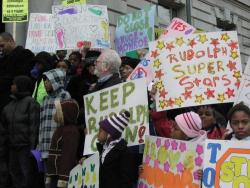 DCPS Chancellor Michelle Rhee unleashed many of her initiatives for reform this year, including a plan to close many thriving schools with high achievement rates. Students, parents and teachers organized in opposition at every school, holding marches and protests and bombarding their councilmembers with phone calls. An activist-run “People’s Meeting” at the Council organized in opposition to the Chancellor’s attempt to have small meetings at each school on the same night drew hundreds and succeeded in saving six schools from closure. Shaw MS, Ron Brown MS, Bruce Monroe ES, Burroughs ES and Smothers ES — all slated to be closed — were spared.
DCPS Chancellor Michelle Rhee unleashed many of her initiatives for reform this year, including a plan to close many thriving schools with high achievement rates. Students, parents and teachers organized in opposition at every school, holding marches and protests and bombarding their councilmembers with phone calls. An activist-run “People’s Meeting” at the Council organized in opposition to the Chancellor’s attempt to have small meetings at each school on the same night drew hundreds and succeeded in saving six schools from closure. Shaw MS, Ron Brown MS, Bruce Monroe ES, Burroughs ES and Smothers ES — all slated to be closed — were spared.
DCPS Bans Armed Services Vocational Aptitude Battery Test In February, concerned parents and lifelong counter-recruitment activist John Judge succeeded in getting DCPS to ban a “career exploration test” that some consider the military’s #1 recruiting tool. After the test is scored, military representatives meet with students to discuss “career options.” High schools in 31 states require juniors to take the ASVAB, but privacy concerns have been raised in many jurisdictions, including Montgomery and Prince George’s County.
POLICE ACCOUNTABILITY
Activists Prevent Trinidad Checkpoints From Spreading Each summer, nearly without fail, city officials construct needlessly repressive measures to counter higher crime rates during the warmest months. Last year youth organizing groups successfully fought an attempt to scapegoat and penalize youth citywide with an earlier curfew and other measures. In June, Chief Cathy Lanier pioneered the use of occupation-style checkpoints, putting an entire corner of the Trinidad neighborhood behind police a line, with residents and their visitors forced to show ID and undergo on-the-spot interrogations. One group of residents filed suit, many testified against the tactic at the City Council and protests were common. Organized opposition was strong enough that after taking down the checkpoint two weeks later, the chief declined to try it in other neighborhoods.
Residents & Advocates Block Warrantless Home Searches In March the MPD announced its intention to send officers to particular neighborhoods to ask to search their homes. The “Safe Homes Initiative” was denounced immediately by many residents, who organized with DC ACORN, the ACLU-National Capital Area and others to offer “Know Your Rights” education to residents to ensure they understood they could decline to participate in the program. Under pressure for this and other controversial proposals, such as a push to arm all officers with assault rifles, the department ultimately decided to scrap the program.
Sex Workers Fight Against Police Harassment, for Inclusion in Local Politics On International Workers Day (May 1st), Different Avenues, together with the Alliance for a Safe and Diverse DC released “Move Along: Policing Sex Work in Washington, DC,” a community-based research report on the experiences of sex workers with police. The report spotlighted an issue that made news throughout the summer and fall, as MPD crackdowns on commercial sex disproportionately targeted sex workers (and, according to the report, Latinos, transgender people and youth). Groups like HIPS organized community clean-up and outreach days in K Street neighborhoods and testified at Council judiciary committee hearings to increase their visibility as workers and community members.
Transgender Rights Activists Fight Rollbacks, Press Dept of Corrections After racking up several victories in 2007 in the struggle for more just treatment of transgender people by the police, fire department and EMS, the DC Trans Coalition was surprised by a proposed rule change by the Office of Human Rights, which decided, during DCTC’s negotiations with the Department of Corrections, to provide an exemption for District agencies who hold people in custody from having to comply with the Human Rights Act on gender identity and expression. They also would have removed other important protections, such as the right to gender-neutral bathrooms. The coalition delivered over 200 petition signatures, and forced Councilmembers to address the issue during confirmation hearings for Attorney General Peter Nickles (who declined to compel the office to enforce the law). DCTC and its allies succeeded in preventing the proposed rule-making and the AG has now agreed to work with the community to develop and enforce better policies to protect the safety, health and dignity of trans people who are incarcerated in the DC jail.
Language Access Advocates Protect Rights In 2004 a coalition of 25 community organizations mobilized their members behind the passage of the DC Language Access Act, which mandates that D.C. government agencies provide the public equal access to government programs, service and information regardless of language ability. Since then the coalition has only expanded its work, as its members understand well that winning passage of new legislation is only the first step in securing justice. Their enforcement campaign won a significant victory in December, when, prompted by a lawsuit brought by the Asian Pacific American Legal Resource Center on behalf of a wrongfully arrested Korean mechanic, the Office of Human Rights ruled that the MPD had violated the language access act by not providing him with an interpreter or translated documents. The ruling is one of the first of its kind in the country against a law enforcement agency.
ACCOUNTABLE DEVELOPMENT/COMMUNITY RIGHTS
Benning Library Advocates Score Legal Victory Three years after being torn down there is still no new Benning Library, but a judge’s ruling in February put activists demanding accountability by DCPL and Mayor Fenty one step closer to their goal. The ruling effectively denounced the mayor for circumventing proper channels of public input, and notched a victory against continued privatization of DC libraries. Last year a grassroots mobilization blocked the City Council from giving away the West End library, and the Council has in the past considered selling off the Martin Luther King, Jr. flagship branch. The organizing effort continued through the summer with a public rally and continued pressure on DCPL authorities. As activist elder and Benning advocate Rick Tingling-Clemmons is fond of saying, “La lucha continua.”
Street Vendors Fight for Equitable Treatment, Public Space Access In yet another battle against Mayor Fenty’s taking of public space, street vendors fought their possible displacement when the City Council approved emergency legislation submitted by the mayor in March to allow him to rewrite rules governing street vending. The mayor said he merely wanted to create more on-street food options, but vendors — who are essentially small business owners, and mostly sell hot dogs and other snack items — said it was a bid to push them out. At least one “organic” venture capital-backed vendor was granted exceptions to vending rules preventing vendors from having more than one location. Dozens of vendors, mostly East African immigrant women, packed a Council hearing on the issue, wearing t-shirts with slogans like “I am a mother of 1,” or “breadwinner of my family,” and also lobbied Councilmembers. The scene was repeated at the end of December, when vendors staged a rally at DCRA to protest inauguration vending rules and demand that the agency enforce consistent requirements and not assess arbitrary fees.
Live Music & Dancing Return to Mt. Pleasant 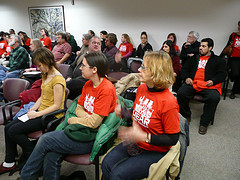 As many District residents are aware, Mt. P has long been the heart of the city’s Latina/o communities, and home to number of restaurants known to double as venues for popular local music acts, in addition to having a much-chronicled contribution as a vital part of the country’s rockabilly and punk music history. Five years ago, a handful of residents took advantage of an obscure DC law that allows as few as five people to protest the renewal of a restaurant’s liquor license if it doesn’t agree to a “voluntary agreement,” effectively tailoring how it does business to fit their needs. The tiny group used their leverage before the Alcohol and Beverage Control Board to effectively ban live music from the main street. Through the grassroots group Hear Mt. Pleasant, restaurant owners worked in coalition with neighborhood allies on a campaign begun in 2006 to restore live music. The activists won their case in the court of public opinion the previous year, racking up thousands of petition signatures, a rally with several hundred people confronting Mayor Fenty, and uncountable fundraisers and other well-attended community events.
As many District residents are aware, Mt. P has long been the heart of the city’s Latina/o communities, and home to number of restaurants known to double as venues for popular local music acts, in addition to having a much-chronicled contribution as a vital part of the country’s rockabilly and punk music history. Five years ago, a handful of residents took advantage of an obscure DC law that allows as few as five people to protest the renewal of a restaurant’s liquor license if it doesn’t agree to a “voluntary agreement,” effectively tailoring how it does business to fit their needs. The tiny group used their leverage before the Alcohol and Beverage Control Board to effectively ban live music from the main street. Through the grassroots group Hear Mt. Pleasant, restaurant owners worked in coalition with neighborhood allies on a campaign begun in 2006 to restore live music. The activists won their case in the court of public opinion the previous year, racking up thousands of petition signatures, a rally with several hundred people confronting Mayor Fenty, and uncountable fundraisers and other well-attended community events.  Their case finally went before the ABC Board in February, complete with attendance by several dozen Hear Mt. P supporters. The board issued their verdict several months later: Haydee’s and Don Jaime’s could once again have live music and dancing, a historic and nearly unprecedented reversal of a so-called “voluntary agreement.” Hear Mt. P and allies continue to press the board to expand the ruling, as the board only agreed to grant Don Juan’s a license for karaoke and mariachis.
Their case finally went before the ABC Board in February, complete with attendance by several dozen Hear Mt. P supporters. The board issued their verdict several months later: Haydee’s and Don Jaime’s could once again have live music and dancing, a historic and nearly unprecedented reversal of a so-called “voluntary agreement.” Hear Mt. P and allies continue to press the board to expand the ruling, as the board only agreed to grant Don Juan’s a license for karaoke and mariachis.
Spotlight: Tenants from across the City Organize for Improved Housing Conditions and Tenant Protections By Anna Duncan
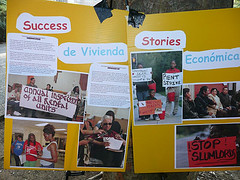 Since June, DC tenants have been organizing a campaign to make the city more responsive to poor building conditions and landlords that don’t repair their rental properties. In July, over 150 residents came together for the first Tenant Town Hall meeting, co-convened by the Tenant Advisory Council, the Latino Economic Development Corporation(LEDC) and Empower DC, and co-sponsored by Legal Aid Society of D.C, Bread for the City, Tenant Action Network, Coalition for Housing Justice Inc., AARP Legal Counsel for the Elderly, The Gray Panthers of Metropolitan Washington, Georgia Avenue/Rock Creek East Family Support Collaborative, Community Coalition for Justice and Peace, We Are Family, the Office of Latino Affairs, Office of the People’s Council, the Human Rights Commission, and other organizations and tenant associations. Tenants related their personal stories to representatives from District agencies and Councilmembers of how poor conditions in rental buildings cause displacement and lead to the loss of affordable housing. Tenants then presented six primary demands and offered specific policy recommendations to address problems related to code inspections, enforcement and repairs with the goal of preserving affordable housing.
Since June, DC tenants have been organizing a campaign to make the city more responsive to poor building conditions and landlords that don’t repair their rental properties. In July, over 150 residents came together for the first Tenant Town Hall meeting, co-convened by the Tenant Advisory Council, the Latino Economic Development Corporation(LEDC) and Empower DC, and co-sponsored by Legal Aid Society of D.C, Bread for the City, Tenant Action Network, Coalition for Housing Justice Inc., AARP Legal Counsel for the Elderly, The Gray Panthers of Metropolitan Washington, Georgia Avenue/Rock Creek East Family Support Collaborative, Community Coalition for Justice and Peace, We Are Family, the Office of Latino Affairs, Office of the People’s Council, the Human Rights Commission, and other organizations and tenant associations. Tenants related their personal stories to representatives from District agencies and Councilmembers of how poor conditions in rental buildings cause displacement and lead to the loss of affordable housing. Tenants then presented six primary demands and offered specific policy recommendations to address problems related to code inspections, enforcement and repairs with the goal of preserving affordable housing.
In November, tenants came together again for a Follow-up Meeting to see what had been accomplished since the Town Hall and hold Councilmembers and agencies accountable for the commitments they made. In response, Ward 1 Councilmember Graham’s office publicly committed to introduce legislation put forward by tenants and advocates. Just two weeks after this follow-up meeting, Councilmembers Graham and Cheh introduced the Omnibus Tenant Protection Act. The legislation addresses the four primary demands of the Tenant Town Hall: Allows tenants (not just landlords) to bring a case to Landlord and Tenant Court; Requires biannual inspections of all rental housing; Establishes guidelines for the use of the city’s Repair Fund; and Ensures tenants are not displaced due to an owner’s failure to make repairs. The legislation will be taken up when the Council returns in January. Tenants will be called on to testify in support of the bill at a hearing in January. Organizers expect that given the strong tenant support for the legislation it will be passed early in 2009. Thanks to all the great work by tenants, organizers, and advocates, DC tenants are winning significant victories to improve and preserve affordable rental housing.
